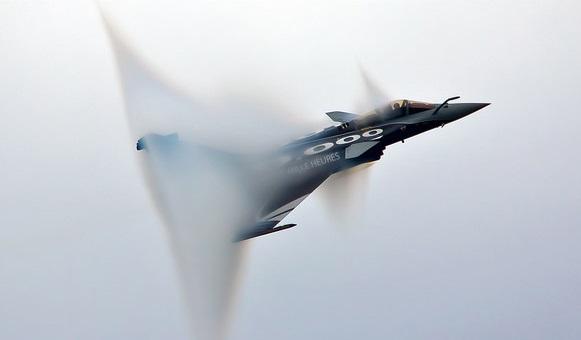
France and India have further deepened their military and economic relationship through India’s purchase of 36 French “Rafale” fighter jets at a cost of almost €8 billion. This order is France’s largest aeronautic contract ever signed overseas, and constitutes a victory for France’s diplomacy in India and for French company Dassault Aviation. The contract should also reinforce the strategic partnership between the two countries.
French Defence Minister Jean-Yves Le Drian went to New Delhi on 23 September to sign the contract. Clearly, tensions pertaining to DCNS’ leaks about India’s submarines haven’t weakened Indian stakeholders’ trust of French armament.
Rafales are usually 100% made in France. They are representative of France’s pride in its innovative industrial savoir-faire because they gather technology from its industrial leaders, such as Thales, Safran and obviously Dassault. The Indian government has accepted that its Rafales will be fully assembled in France because Dassault wants to protect its technology. However, the French aeronautic company has agreed to transfer the production of some parts of the motors and cabins to India, probably a political necessity as New Delhi is currently promoting ‘Make in India’ policies.
The 36 Rafales should enable the development of some technological partnerships between France and India. Dassault Aviation, which agreed to invest €4 billion in India, has constituted a local joint-company with Indian Reliance ADA. This cooperation will include technological transfers, with Dassault investing in the research and development programs of the Indian Ministry of Defence, and industrial partnerships which could lead to the creation of 1,500 jobs in India. Moreover, the Rafale package will see the aviation company also provide armament and training programs for pilots and maintenance workers.
Strategically, the French–Indian fighter jets contract goes along with the deepening of New Delhi’s and Paris’ dialogue for the security of the Indian Ocean.
As expressed in its last Defence White Paper in 2013, France intends to reinforce its presence in the Indian Ocean, which hosts several French overseas territories, especially Reunion Island and Mayotte. The economic stakes are high for France because most of its trade with Asia follows maritime routes in the Indian Ocean.
India is currently modernising its Navy and Air Forces in order to strengthen its regional presence. Prime Minister Modi has also asserted this strategic ambition by deepening its dialogue with his neighbours. For instance, India has reinforced its military and civilian assistance to Sri Lanka, the Seychelles and Mauritius, three states where China tries to invest heavily. Having watched China’s aggressiveness in the South China Sea dispute, New Delhi is determined to assert its influence and power over the Indian Ocean.
China seems to consider the Rafales as a threatening symbol of India’s ambitions. In fact, the Rafales, which have the ability to carry nuclear weapons, will be positioned close to India’s borders with China and Pakistan. India’s Defence Minister even explained that the first Rafales could be delivered sooner than planned in case of renewed tensions with Pakistan.
During his visit to New Delhi on 23 September, French Defence Minister Jean-Yves Le Drian explained that Paris understood this contract as a tool in order to strengthen its significant strategic partnership with India. France was the first country to elaborate such a partnership with New Delhi in 1998. French policy-makers share India’s fear regarding China military’s assertiveness. Le Drian explained that France perceives India as one of its main partners in maintaining the stability of the region. Selling Rafales to New Delhi enables France to empower its partner’s defence capabilities, as was previously the case with French exports to India of Scorpene submarines and Mirage 2000 fighter jets.
Paris doesn’t only rely on its partnership with India. It also wishes to increase its collaboration with Australia on these regional issues. French diplomats and policy-makers have regular dialogues with their Australian counterparts to help align their strategies in order to secure their interests in the Indian Ocean.
Economically, the French media also insist that the Rafale contract will enable France to reverse its trade deficit with India. In 2015, France imported €5.4 billion of Indian goods and services but its exports to New Delhi only reached €3.2 billion. This defence contract will reverse the trend and constitutes a positive outcome for the French economy, which relies on exports to support its fragile growth. Moreover, France and India keep increasing their economic links. India was France’s 15th trade partner in 2015, up significantly from 26th in 2014. The Rafale contract reinforces this dynamic.
The recent DCNS data leaks and the potential damage they could have impacted on the French–Indian relationship seem to belong to the past. After years of negotiations, India and France have, at last, agreed on a Rafale contract, corresponding to both countries’ strategy to secure their interests in the Indian Ocean.